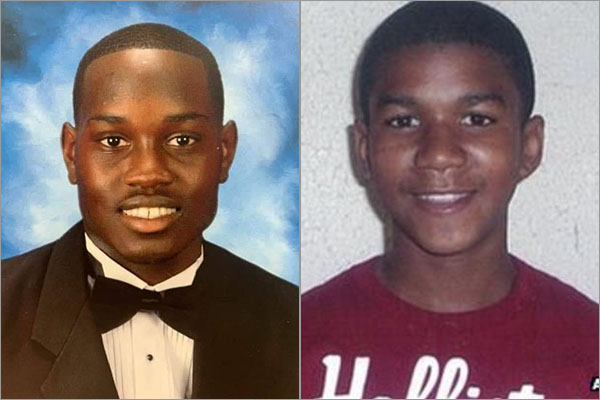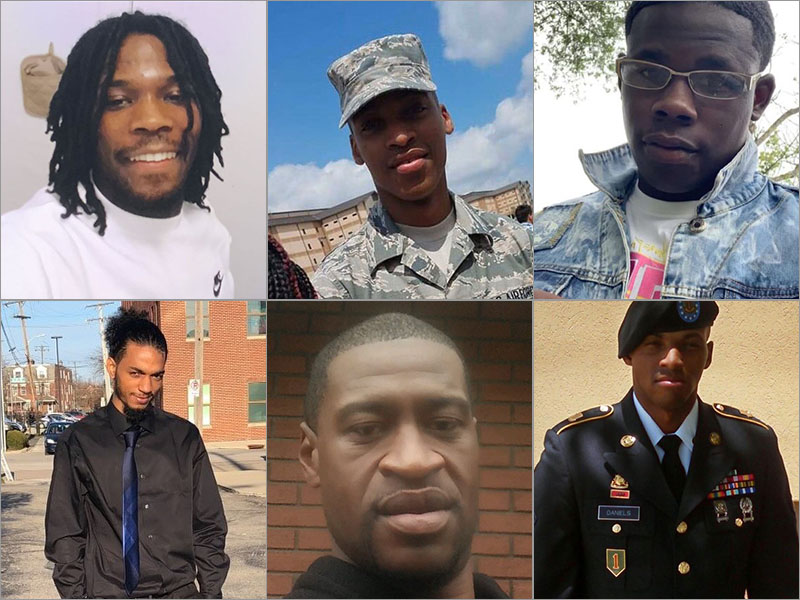Ben Crump Lists Similarities Between Ahmaud Arbery And Trayvon Martin
Ben Crump Lists The Chilling Similarities Between Ahmaud Arbery And Trayvon Martin Shootings

Source: Twitter
The fatal shooting of Ahmaud Arbery has once again brought to light racist vigilantism in the United States and how killers can use the argument of “self-defense” as a way to hide behind the law.
Gregory and Travis McMichael were arrested by the Georgia Bureau of Investigation (GBI) for the killing of Arbery in Brunswick, Georgia, back in February. They assumed he was a neighborhood burglar and they hopped inside a truck, armed with a .357 magnum revolver and a shotgun, to chase down a jogging Arbery. A confrontation in the middle of the road led to Arbery getting shot twice in the chest with a third bullet grazing his right wrist, according to an autopsy. A video of the incident was released last week sparking outrage, and now leaders are vying for a grand jury to convene so that Travis and Gregory can be indicted.
The attorney for Arbery’s family, Benjamin Crump, noted that there are chilling similarities between Arbery’s case and the case of another unarmed pedestrian killed by a vigilante.
Trayvon Martin was shot and killed on Feb. 26, 2012, by George Zimmerman, a then-neighborhood watch volunteer in Sanford, Florida. Martin was only 17 years old when he died and he would have been 26 in February of this year. Crump also backed Martin’s family during the tumultuous early 2010s period that inspired a Movement fo Black Lives. This makes Crump an expert in outlining the uncanny, yet sad similarities between Martin and Arbery in an interview with Jonathan Capehart on The Washington Post‘s Cape Up podcast.
Crump explained:
“When you think about the fact that both of them were killed in the month of February—Trayvon on February 26, 2012, and Ahmaud on February 23, 2020. The fact that both of them would have been 26 years old this year had they still been living. The fact that both of them were accused of burglary, even though there was no evidence to support anything of the sort. The fact that both of their killers had guns, yet they were unarmed, and both of their killers are advancing some type of self-defense ‘stand your ground’ argument.”
Before recusing himself from the case, prosecutor George Barnhill tried to argue that Gregory and his son Travis were protected under Georgia’s citizen’s arrest statute. In a letter to the Glynn County Police Department, Barnhill argued that Gregory and Travis had been legally carrying their weapons under Georgia law and because Arbery was a “burglary suspect,” they had “solid firsthand probable cause” to chase Arbery under the state’s citizen’s arrest law. When Travis and Arbery struggled with his shotgun, which can be seen in the video, Barnhill argued that Travis and Gregory acted in self defense when gunshots went off.
With support from Barnhill’s argument — along with the fact that a grand jury wasn’t in session to indict the McMichael’s because of coronavirus lockdowns — Travis and Gregory spent over two months not being arrested. Similarly, George Zimmerman was released from police custody the day of Martin’s death because police said there was no evidence to refute Zimmerman’s claim that he acting in self defense when he pursued and shot Martin — a kid he suspected to be a burglar.
Crump noted the similarities: “The fact that both of their killers, Trayvon Martin killer got to go home and sleep in his bed at night, after he shot and killed him in that gated community, in Sanford, Florida, alleging some type of burglary allegation, and then in Ahmaud Arbery, his killer shot and killed him and they got to go home and sleep in their beds at night, after advancing some kind of allegation about burglary in the Satilla Shores community in Brunswick, Georgia.”
Crump continued with his seventh similarity: “The fact that both the prosecutors in the cases—in Sanford, Florida, the local prosecutor recused himself because some alleged conflict of interest, then, in Brunswick, Georgia, the local prosecutor recused herself because of some alleged conflict of interest.”
Arbery’s mother, Wanda Cooper, fought for prosecutor Barnhill to recuse himself from the case after she discovered that his son works in the Brunswick district attorney’s office, which had previously employed Gregory McMichael. Another Brunswick district attorney, Jackie Johnson, also recused herself because McMichael had worked in her office.
The case eventually went to Tom Durden of Hinesville, Georgia, who failed to move the case forward until the viral video spark national outcry and action. Durden then got the GBI involved, which led to the arrests of Gregory and Travis McMichael along with further investigations. Now, a special prosecutor has replaced Durden — Cobb County District Attorney Joyette Holmes.
In his comparison of Arbery’s case and Martin’s case, Crump ended by saying that both involved a pursuit, however, one could be witnessed by the world via an audio recording and the other could be witnessed via a video recording.
“You have evidence of a pursuit—objective evidence of a pursuit in both cases,” Crump explained. “With Trayvon, you have audio evidence; we hear the chase, and you hear the shot that kills Trayvon. Well, the big difference in Ahmaud Arbery, we get to physically see the pursuit with our eyes in that horrific video, where they chase him and then they kill him, with that shotgun being pumped. And so that is the big difference in these cases.”
In a Monday statement, Holmes said that her office seeks to present Arbery’s case to a grand jury for an indictment while acknowledging that the courts are closed through June 12. However, according to USA Today, she said her team “will work as expeditiously as possible to move the case forward.”
SEE ALSO:
Legally Armed Black Citizens Patrol White Neighborhood Where Ahmaud Arbery Was Killed
Cops Sue To Regain White Male Privileges After Being Demoted And Fired Over ‘Diversity’


















